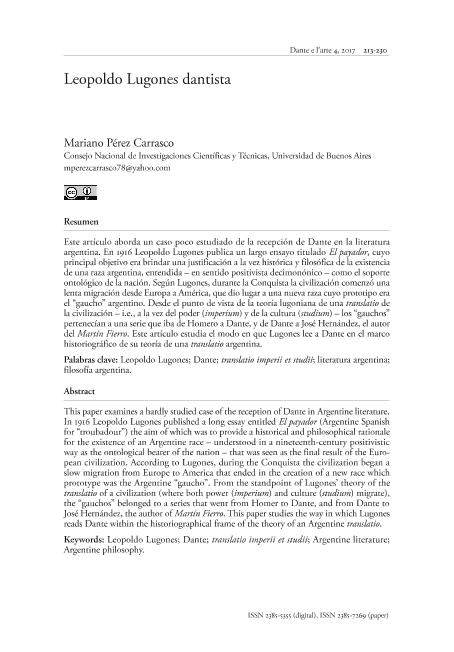Artículo
Este artículo aborda un caso poco estudiado de la recepción de Dante en la literatura argentina. En 1916 Leopoldo Lugones publica un largo ensayo titulado El payador, cuyo principal objetivo era brindar una justificación a la vez histórica y filosófica de la existencia de una raza argentina, entendida – en sentido positivista decimonónico – como el soporte ontológico de la nación. Según Lugones, durante la Conquista la civilización comenzó una lenta migración desde Europa a América, que dio lugar a una nueva raza cuyo prototipo era el “gaucho” argentino. Desde el punto de vista de la teoría lugoniana de una translatio de la civilización – i.e., a la vez del poder (imperium) y de la cultura (studium) – los “gauchos” pertenecían a una serie que iba de Homero a Dante, y de Dante a José Hernández, el autor del Martín Fierro. Este artículo estudia el modo en que Lugones lee a Dante en el marco historiográfico de su teoría de una translatio argentina. This paper examines a hardly studied case of the reception of Dante in Argentine literature. In 1916 Leopoldo Lugones published a long essay entitled El payador (Argentine Spanish for “troubadour”) the aim of which was to provide a historical and philosophical rationale for the existence of an Argentine race – understood in a nineteenth-century positivistic way as the ontological bearer of the nation – that was seen as the final result of the European civilization. According to Lugones, during the Conquista the civilization began a slow migration from Europe to America that ended in the creation of a new race which prototype was the Argentine “gaucho”. From the standpoint of Lugones’ theory of the translatio of a civilization (where both power (imperium) and culture (studium) migrate), the “gauchos” belonged to a series that went from Homer to Dante, and from Dante to José Hernández, the author of Martín Fierro. This paper studies the way in which Lugones reads Dante within the historiographical frame of the theory of an Argentine translatio.
Leopoldo Lugones dantista
Fecha de publicación:
12/2017
Editorial:
Universitat Autònoma de Barcelona
Revista:
Dante e l'Arte
ISSN:
2385-5355
Idioma:
Español
Tipo de recurso:
Artículo publicado
Clasificación temática:
Resumen
Archivos asociados
Licencia
Identificadores
Colecciones
Articulos(SEDE CENTRAL)
Articulos de SEDE CENTRAL
Articulos de SEDE CENTRAL
Citación
Perez Carrasco, Mariano; Leopoldo Lugones dantista; Universitat Autònoma de Barcelona; Dante e l'Arte; 4; 12-2017; 213-230
Compartir




